
How to Ward off Cancer in Just 60 Seconds a Day
Dear Living Well Daily Reader,
Imagine you’re about to be dropped off on a deserted island for a year and you can only bring the seeds for one vegetable.
Which would you choose?
Well, if you’re looking to significantly increase your body’s ability to fight cancer cells, there’s a clear winner: broccoli seeds.
The consumption of broccoli and other cruciferous vegetables has long been linked to reduced rates of cancer in epidemiological studies, and recent research is showing that one of the compounds in broccoli may hold the key to optimizing the body’s ability to ward of cancer.
And in just a minute, I’ll show you how you can get up to 30 times the cancer-busting benefits of broccoli without eating a single floret (and no, it’s not by taking a supplement).
Broccoli contains a compound called glucoraphanin, which is a precursor to a compound called sulforaphane.
Sulforaphane has strong anti-cancer properties and works against cancer in two ways.
First, it helps block the initiation of cancer by inhibiting the metabolism of procarcinogenic substances into carcinogens. That means it helps stop those could-be cancerous substances from becoming cancerous. Sulforaphane also helps the body detoxify carcinogenic substances and excrete them from the body.
And second, if cancer has already begun to grow in the body, sulforaphane can help shut it down by modulating cell growth and cell death.
Sulforaphane has been shown in in vitro studies to have anti-cancer effects against prostate, breast, colon, and urinary cancer cells. Most importantly, it has been shown to inhibit cancer stem cells.
The stem cells are the parent cells of cancer, and if they are not destroyed, the chances of the cancer returning are high. Most conventional cancer treatments, including radiation and some forms of chemotherapy, do not affect cancer stems cells.
Compounds that can inhibit or kill cancer stem cells are the best defense in the fight against cancer.
And that’s good news. But when researchers tried to calculate the amount of broccoli one would have to eat to have a significant amount of protection against cancer, they found that it would take about two pounds per week.
And that’s raw broccoli, since cooking can destroy the enzymes that are necessary for sulforaphane to be absorbed in the body.
The thought of that much raw broccoli makes my stomach groan. Not because I don’t like broccoli, but because it’s quite hard to digest in its raw state.
(Fun fact: Tom “Broccoli” Landers holds the world record for eating a pound of raw broccoli in just 92 seconds. I’d want to be far, far away from Mr. Landers about an hour or two after that competition.)
But there’s a much easier way to get all the cancer-busting benefit of broccoli without having to stuff yourself with it every day: broccoli sprouts!
Broccoli sprouts may actually be even more powerful for fighting cancer than mature broccoli, as they are extremely rich in glucoraphanin. In fact, just 5 grams of broccoli sprouts contain the same amount of glucoraphanin as 150 grams of mature broccoli.
With broccoli spouts, just a few tablespoons a couple of times a week is enough to offer significant protection.
Broccoli sprouts have also been shown to help protect against gastritis (stomach inflammation) caused by H. pylori infection, and may also help protect the skin against UV radiation.
Though you can find sprouts in the grocery store, they are very easy to grow. I’ve been growing sprouts every couple of weeks for the past year, and all it takes is about 60 seconds a day.
First, you’ll need a bowl, a mason jar, some sprouting seeds, and a sprouting lid that fits the mason jar. You can also use a reusable coffee filter instead of a sprouting lid.
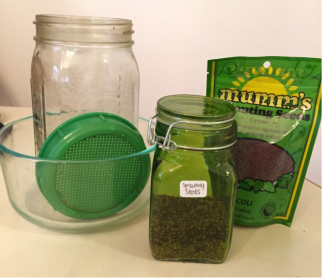
The seeds in the jar are for a mixture of broccoli, alfalfa, and other plants. The package is all broccoli seeds.
First, put about a tablespoon of the seeds into the jar and cover them with water. Let them sit in the water for about eight hours.
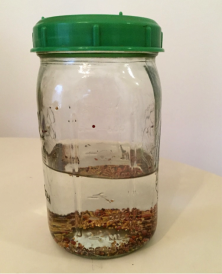
Then, drain the water and rinse the sprouts. Prop the mason jar in the bowl like so:
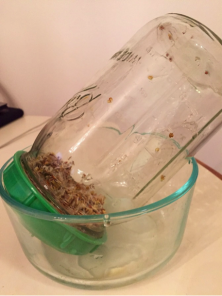
These are the sprouts after about two days. You’ll notice the little white roots starting to emerge
Twice a day, rinse the sprouts by filling the jar through the sprouting lid and draining the water. Then prop it in the bowl again. Keep the sprout jar on your counter, but not in direct sunlight.
After about five-seven days, you’ll have a decent amount of sprouts:
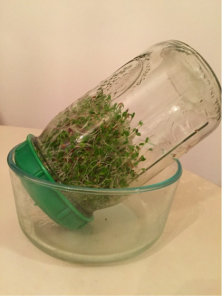
On the day before you want to use them, put them in a sunny window to help them get greener.
To store them, I like to take the sprouts out of the jar, leaving them attached to the lid, and let them sit on the counter for a couple hours to dry out just a bit. Then I carefully remove them from the lid and put them in a storage container that’s been lined with a paper towel.
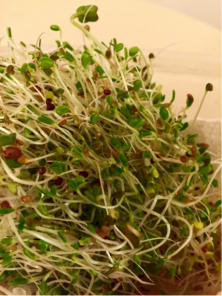
And voila! You just grew you own cancer-fighting superfood.
You can use the sprouts in your morning omelet, on your salad, or even just by themselves as a side with your dinner. They taste pretty neutral, not nearly as strong as mature broccoli.
To living well,

Jasmine LeMaster
Health Researcher
View More Free Articles
Stop Obsessing Over Diet Trends
Can we stop with the endless diet debates already? Every other week there’s a new headline shouting about which diet is best for weight loss, heart health, or diabetes. Paleo, keto, low-carb, high-protein… it’s exhausting. And now, a new meta-analysis is out comparing the Mediterranean diet, the DASH diet, and something called AHEI (that’s “Alternative...
A New Reason to Ditch Processed Junk
If you’ve ever walked the inside aisles of your local grocery store and thought, “This is all just junk,” your instincts were spot on. A new study published in the journal Thorax just added another red flag to the list of dangers linked to ultra-processed food—a 41 percent higher risk of lung cancer. That’s right....
When Being Winded on Stairs Is Serious (And When It Isn’t)
I had an athlete visit me recently because he experienced shortness of breath while climbing stairs. He is in great shape, so he was worried about what it might mean. “Doc,” he said, “I run five miles three times a week. Why am I huffing and puffing after two flights of stairs?” His concern is...
Study EXPOSES Hidden Danger Lurking in Your Car
We think of our homes and cars as safe havens. But according to a startling new study, they may be flooding your lungs with microscopic plastic particles—every single day. Researchers in France recently found that adults inhale an average of 68,000 microplastic particles daily from indoor air alone. To put that in perspective, that’s about...
Mailbag: Is Modern Food Making You Snore?
“What can cause snoring, and is there a way to correct this issue?” —Seeking Silence Hi Seeking, Snoring happens when the soft tissues in your throat relax and vibrate as air passes through during sleep. While several factors can cause snoring—from sleep position to nasal congestion—I want to share one trigger that might surprise you....
Simple Food Swap SLASHES Dementia Risk 28%
Let’s be honest… who would jump at the chance to cut their dementia risk by 28 percent. And no, you don’t need to run marathons, survive on broccoli, or learn to play the zither (whatever that is) to make it happen. All it takes is one easy swap—something that’s probably already in your refrigerator. Researchers...
This SMART Floss Exposes Hidden Health Danger
Scientists have created dental floss that doesn’t just clean between your teeth—it also tracks your stress while you’re flossing. Now, I know what you’re thinking… “Great—now even flossing is going to stress me out by telling me how stressed I am.” But this fascinating new tool from Tufts University could be a game-changer for understanding...
Is This "Safe" Sweetener Damaging Your Brain?
The headlines are alarming… “Popular Sugar Substitute Linked to Brain Cell Damage” and “Erythritol Could Damage Critical Brain Barrier” are just two of the dozens I’ve spotted recently. But before you toss every sugar-free product in your pantry, let’s take a closer look at what this study actually shows—and what it doesn’t. The latest research...
This Summer Threat Could SPIKE Your Blood Sugar
Picture this… It’s another scorching hot summer day. You crank up the air conditioning while watching the weather forecast, which predicts yet another “record-breaking” heat wave. It’s starting to feel like just another miserably uncomfortable summer. But what you might not realize is that—if you have diabetes—those rising temps could do far more damage to...
Move Over Yogurt—5 Foods That Pack MORE Probiotics
Let’s talk about your gut. The microbiome is the collection of trillions of bacteria and other tiny organisms that live in and on your body—especially in your gut—and help keep you healthy. I’ve written often about how vital it is to maintain a healthy microbiome. And you might have dutifully added yogurt to your shopping...









